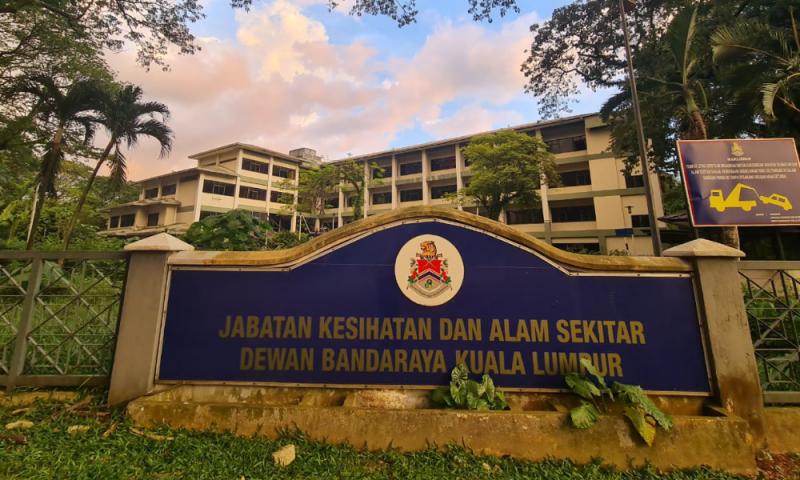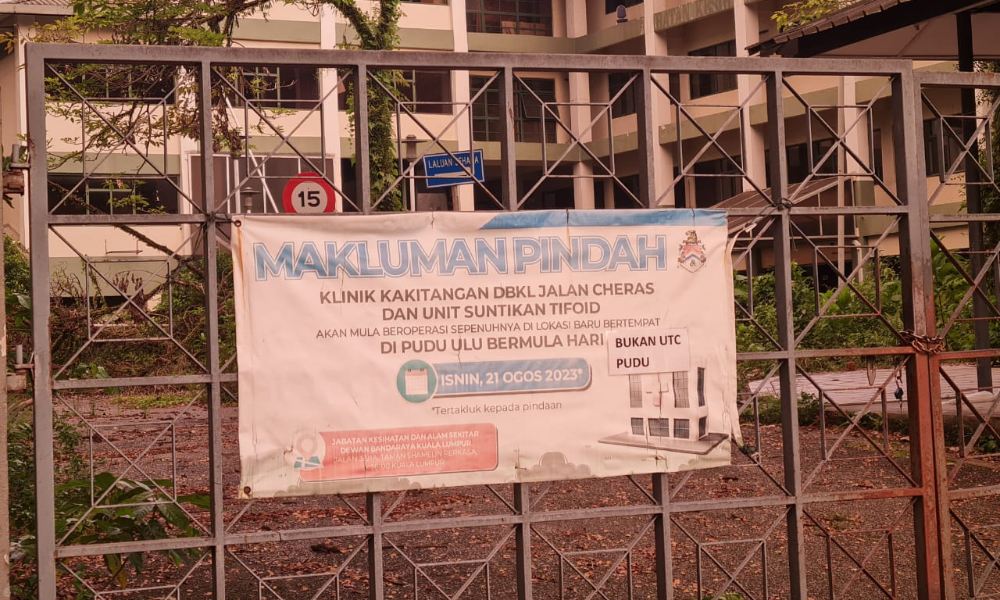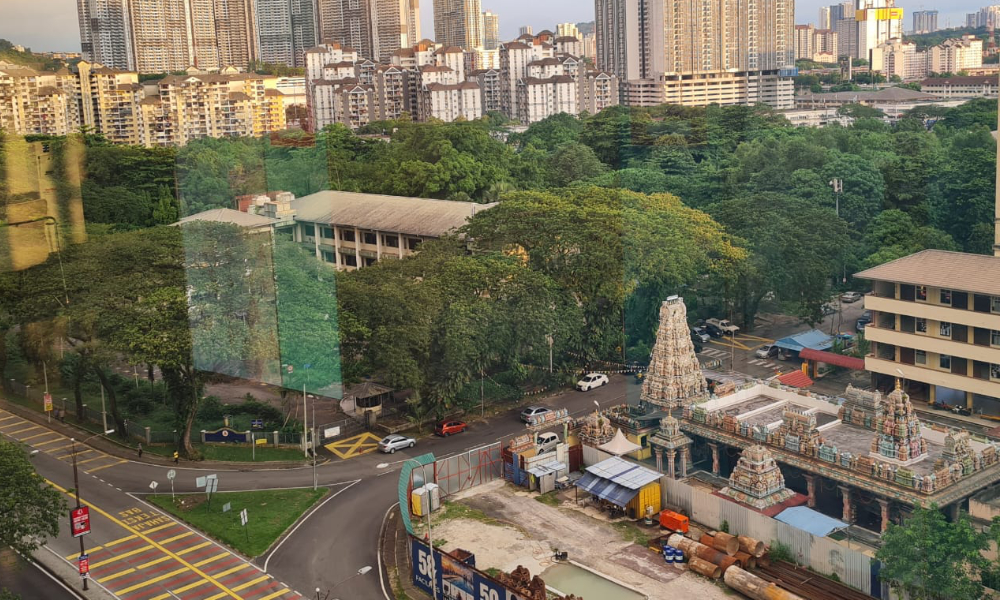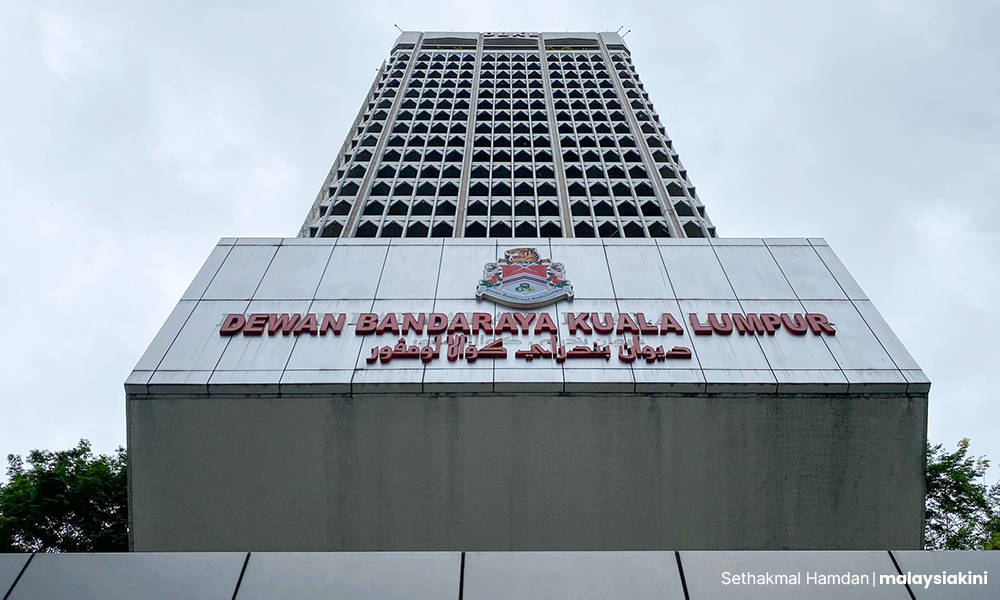


R Nadeswaran
Published: Apr 22, 2025 10:00 AM
Updated: 12:00 PM
COMMENT | As the signboard suggests, Kuala Lumpur City Hall’s (DBKL) Health and Environment Department houses a clinic where its staff and their families could seek treatment.
It also served as a vaccination centre for hawkers, petty traders, and food handlers to get their typhoid jabs, as required by regulations.
Off Jalan Cheras, it covers an area of about 129,100 sq m, houses the medical clinics, and is the location for related meetings, conferences, and training.
But in August 2023, it closed its doors for good. No reasons were given except that notices appeared on plastic banners at the entrances directing patients to the health clinic in Ulu Pudu.
Almost two years of neglect through non-occupation produced the undergrowth and other unwanted fauna.
But why did DBKL close the clinic? After all, it served the community with quarters for DBKL staff nearby and a regular stream of traders coming in for the annual jabs. It was a community health centre serving the people in the neighbourhood and the public.
A search at the Land Office, however, revealed a startling discovery - a company called Perano Development Sdn Bhd had placed a caveat on the land in August 2013.
Besides, an endorsement stipulates that land can only be used for workshops, clinics, and related activities.
Published: Apr 22, 2025 10:00 AM
Updated: 12:00 PM
COMMENT | As the signboard suggests, Kuala Lumpur City Hall’s (DBKL) Health and Environment Department houses a clinic where its staff and their families could seek treatment.
It also served as a vaccination centre for hawkers, petty traders, and food handlers to get their typhoid jabs, as required by regulations.
Off Jalan Cheras, it covers an area of about 129,100 sq m, houses the medical clinics, and is the location for related meetings, conferences, and training.
But in August 2023, it closed its doors for good. No reasons were given except that notices appeared on plastic banners at the entrances directing patients to the health clinic in Ulu Pudu.
Almost two years of neglect through non-occupation produced the undergrowth and other unwanted fauna.
But why did DBKL close the clinic? After all, it served the community with quarters for DBKL staff nearby and a regular stream of traders coming in for the annual jabs. It was a community health centre serving the people in the neighbourhood and the public.
A search at the Land Office, however, revealed a startling discovery - a company called Perano Development Sdn Bhd had placed a caveat on the land in August 2013.
Besides, an endorsement stipulates that land can only be used for workshops, clinics, and related activities.

A notice at the Health and Environment Department gate directing patients to Ulu Pudu for their treatment
It also stipulates that land cannot be sold, leased or mortgaged without the approval of the Federal Territory Land Council.
Jakel Trading subsidiary
According to news reports, Perano was incorporated on May 18, 2007, and is registered as an investment holding company that trades in textiles. It is one of the 26 subsidiaries under Jakel Trading.
The company was one of the many entities and individuals whose bank accounts were frozen in 2018 to recover RM194 million they allegedly received from disgraced former prime minister Najib Abdul Razak.
MACC claimed the freeze would be necessary should the entities become insolvent.
Thevini Nayagam, Perano’s lawyer, argued in the High Court that the company had an annual income of RM14 million and is not insolvent.
“Perano is also part of the Jakel Group, which has hundreds of millions in annual income. These are not assets, but income. All those insolvency arguments do not apply to our case,” said the lawyer.
MACC withdrew the application when the case went up to the Federal Court.
But why would Perano put a caveat on the land? Did the company buy the land? If so, why has the transfer not been done since 2013?
Real estate experts say a caveat is usually placed after the sale and purchase agreement is signed with earnest money or a deposit, usually 10 percent of the total sum. The remaining 90 percent must be paid before the title changes hands.
It also stipulates that land cannot be sold, leased or mortgaged without the approval of the Federal Territory Land Council.
Jakel Trading subsidiary
According to news reports, Perano was incorporated on May 18, 2007, and is registered as an investment holding company that trades in textiles. It is one of the 26 subsidiaries under Jakel Trading.
The company was one of the many entities and individuals whose bank accounts were frozen in 2018 to recover RM194 million they allegedly received from disgraced former prime minister Najib Abdul Razak.
MACC claimed the freeze would be necessary should the entities become insolvent.
Thevini Nayagam, Perano’s lawyer, argued in the High Court that the company had an annual income of RM14 million and is not insolvent.
“Perano is also part of the Jakel Group, which has hundreds of millions in annual income. These are not assets, but income. All those insolvency arguments do not apply to our case,” said the lawyer.
MACC withdrew the application when the case went up to the Federal Court.
But why would Perano put a caveat on the land? Did the company buy the land? If so, why has the transfer not been done since 2013?
Real estate experts say a caveat is usually placed after the sale and purchase agreement is signed with earnest money or a deposit, usually 10 percent of the total sum. The remaining 90 percent must be paid before the title changes hands.

An aerial view of the prime plot of land in Kuala Lumpur
As the name suggests, earnest money ensures that only genuine buyers stake their interest in the purchase.
How much?
So, in this case, how much earnest money did DBKL collect? Was the land properly valued? Was a sale and purchase agreement signed, or was it a case of “you take the land first, we talk later”?
And if so, what were the terms of the sale? It has been almost 12 years, and if the remaining sum has not been paid, shouldn’t the deal be called off, the deposit forfeited, and the caveat removed?
The more one digs into this land deal, the more questions arise.
Why would DBKL close the clinic, having operated it for 10 years after the caveat was placed? DBKL owns the land on paper and legally, and a third party has registered its interest. So why the hurry to vacate?
Wasn’t DBKL aware of the restrictions on the land? Did it get approval to sell the land, let alone re-designate its status to commercial or housing?
Some land brokers asked, “Was the earnest money spent as a small outlay to flip the land later to another buyer when the land price escalates?” This may be mere speculation, but estate agents say this is not uncommon.
They referred to Jakel’s sale of the velodrome land to Radium Development earlier this year, where the land was sold for more than three times the original purchase price from DBKL, five years after the initial sale.
As the name suggests, earnest money ensures that only genuine buyers stake their interest in the purchase.
How much?
So, in this case, how much earnest money did DBKL collect? Was the land properly valued? Was a sale and purchase agreement signed, or was it a case of “you take the land first, we talk later”?
And if so, what were the terms of the sale? It has been almost 12 years, and if the remaining sum has not been paid, shouldn’t the deal be called off, the deposit forfeited, and the caveat removed?
The more one digs into this land deal, the more questions arise.
Why would DBKL close the clinic, having operated it for 10 years after the caveat was placed? DBKL owns the land on paper and legally, and a third party has registered its interest. So why the hurry to vacate?
Wasn’t DBKL aware of the restrictions on the land? Did it get approval to sell the land, let alone re-designate its status to commercial or housing?
Some land brokers asked, “Was the earnest money spent as a small outlay to flip the land later to another buyer when the land price escalates?” This may be mere speculation, but estate agents say this is not uncommon.
They referred to Jakel’s sale of the velodrome land to Radium Development earlier this year, where the land was sold for more than three times the original purchase price from DBKL, five years after the initial sale.

Knowing that DBKL will retreat into its cocoon, I sent a note to Norhaslinda Nordin, the head of its Corporate Planning Department, saying: “I refer to the Klinik Kesihatan along 3rd Nile Jalan Cheras. It has been moved. But there’s a caveat on the land by Perano. Has the land been sold or is this caveat put in pending the sale?”
An immediate reply was: “I will provide the necessary information after receiving it from the relevant department.” I provided two relevant photographs. That was last Thursday. I sent a reminder yesterday (Monday) that I am still awaiting a response. “Okay. Will do,” was the reply.
The land is the size of 17 Fifa-standard football fields, and if nearby transactions are used as a yardstick, it is now worth several hundred million.
Deaf to transparency
In July 2020, during the movement control order, Boustead Properties Bhd sought to sell a 2.93-acre (1.19ha) parcel along Jalan Cochrane for RM147 million or RM1,152 per sq ft, but only got RM138 million.
Even if the clinic land is valued at RM800 per sq ft, it would fetch a princely RM1.1 billion.
Wouldn’t it be prudent for DBKL to cancel the deal if it is not paid within the stipulated period? What is it waiting for?
I had called for openness and transparency in land deals on several occasions, but they have fallen on deaf ears.
DBKL can no longer remain silent and claim it “was done by the previous administration”. Surely there must be records of this and many other similar transactions.
Also, the Public Accounts Committee (PAC), which had previously flagged dubious deals, must investigate such transactions and expose the shenanigans and the people behind them - present and past - irrespective of their titles or the prefixes before their names.
It must be revisited, and billions in lost revenue must be recouped and used for the betterment of the community. Isn’t this what we were promised before the 2022 general elections?
R NADESWARAN is a veteran journalist who tries to live up to the ethos of civil rights leader John Lewis: “When you see something that is not right, not fair, not just, you have to speak up. You have to say something; you have to do something.” Comments: citizen.nades22@gmail.com

No comments:
Post a Comment